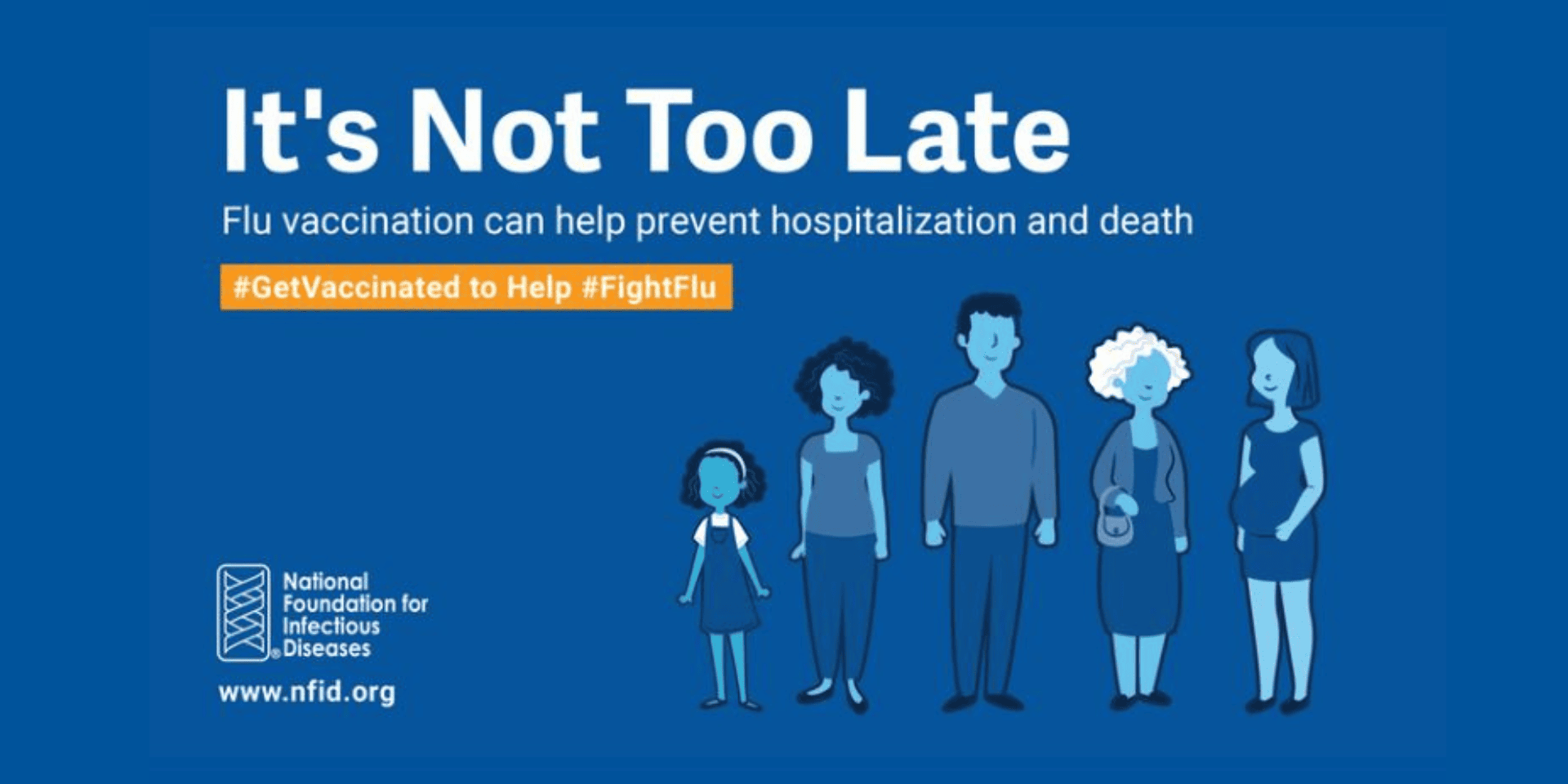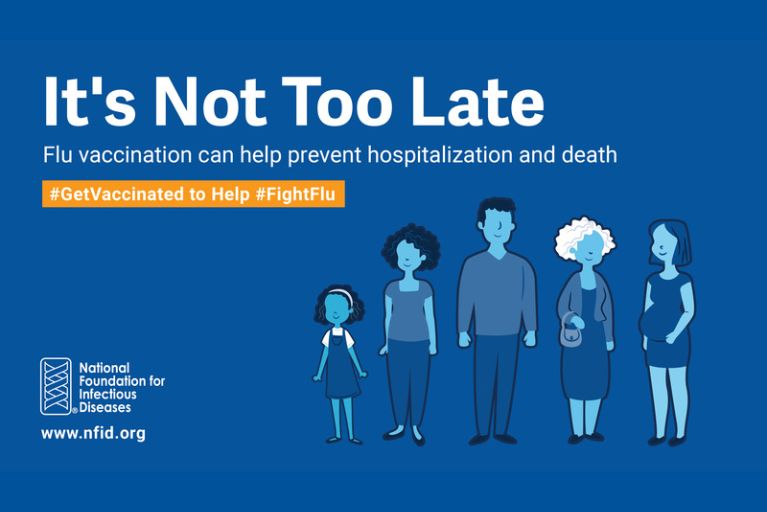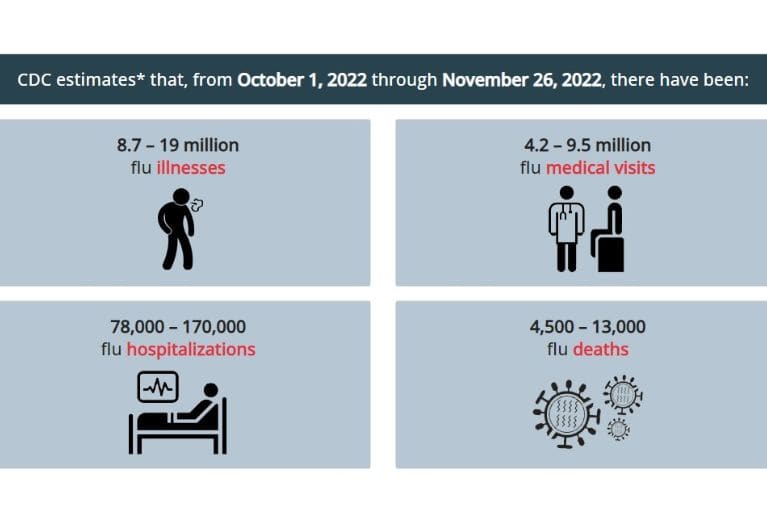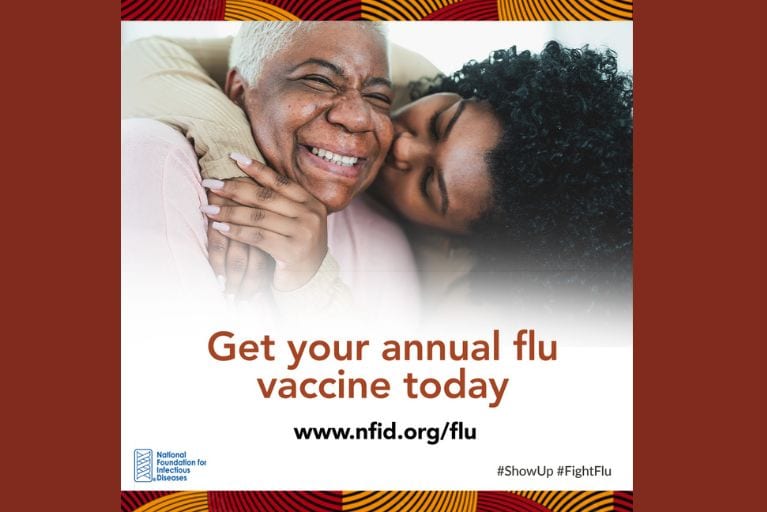
 With influenza (flu) activity now high across the US, the National Foundation for Infectious Diseases (NFID) is joining the Centers for Disease Control and Prevention (CDC) in reminding everyone that it is not too late to benefit from annual flu vaccination. Special thanks to José R. Romero, MD, director of the National Center for Immunization and Respiratory Diseases at CDC for this guest blog post for National Influenza Vaccination Week (December 5-9, 2022).
With influenza (flu) activity now high across the US, the National Foundation for Infectious Diseases (NFID) is joining the Centers for Disease Control and Prevention (CDC) in reminding everyone that it is not too late to benefit from annual flu vaccination. Special thanks to José R. Romero, MD, director of the National Center for Immunization and Respiratory Diseases at CDC for this guest blog post for National Influenza Vaccination Week (December 5-9, 2022).
As long as flu poses a threat to the community, CDC recommends that flu vaccination continue. That guidance certainly applies today, as the US experiences higher levels of flu activity for this time of year than seen in previous seasons, including the highest hospitalization rates of the past 10 years. At least 14 pediatric deaths have been reported so far this season. While flu is difficult to predict, flu activity continues to increase, and is expected to continue to spread for weeks or even months. If you have not already done so, there is still time to get yourself and your family vaccinated against flu.
 Getting a flu vaccine is a safe and quick way to help protect yourself and your family from flu and its potentially serious complications. Even in cases when flu vaccination does not prevent infection completely, it can reduce the duration and severity of flu illness and can help prevent serious complications, including hospitalization and death. Annual flu vaccination is recommended for everyone age 6 months and older and is especially important for those who are at higher risk of developing serious flu illness, including:
Getting a flu vaccine is a safe and quick way to help protect yourself and your family from flu and its potentially serious complications. Even in cases when flu vaccination does not prevent infection completely, it can reduce the duration and severity of flu illness and can help prevent serious complications, including hospitalization and death. Annual flu vaccination is recommended for everyone age 6 months and older and is especially important for those who are at higher risk of developing serious flu illness, including:
- Infants and children age 5 years and younger
- Adults age 65 years and older
- Pregnant women
- Those with certain chronic health conditions, including heart disease, lung disease, kidney disease, and diabetes (even when the chronic condition is well managed)
- Certain racial and ethnic groups
According to a CDC Vital Signs report, Black, Hispanic, and American Indian/Alaska Native adults in the US are more likely to be hospitalized with flu, as well as less likely to be vaccinated against flu. CDC is working to address barriers and raise awareness about the importance of annual flu vaccination.
I urge everyone who has not yet gotten a flu vaccine to visit a pharmacy or healthcare professional and get vaccinated against flu before the upcoming holidays.
José R. Romero, MD, director of CDC National Center for Immunization and Respiratory Diseases
 Flu Activity Is High and Vaccination Rates Lag
Flu Activity Is High and Vaccination Rates Lag
As of November 2022, 154.1 million doses of flu vaccine had been distributed in the US. However, vaccination coverage is lagging. CDC is tracking flu vaccine coverage and has been concerned about lower vaccination coverage in certain groups of people:
- For pregnant women, overall 2022-2023 flu vaccination coverage at the end of October 2022 was 12.1 percentage points lower compared with the end of October 2021 and 21.7 percentage points lower than at the end of October 2020.
- Coverage among children age 6 months-17 years so far this season is similar to last season, but down about 5.5 percentage points from pre-COVID-19 pandemic levels.
- Among adults age 18 years and older, claims data indicate about 2.4 million fewer doses of flu vaccine have been given in pharmacies and physician offices this season compared to last, which is about a 4% decrease from last season at the same time. However, survey-based data suggests coverage is 3.3 percentage points higher than last season.
- Racial disparities persist. Coverage among Black and White adults has increased while coverage among Hispanic adults remained the same compared to this time last year. Coverage among Black and Hispanic children is up, while coverage among White children is down compared to last flu season.
- Coverage among children and adults in rural areas is lower than in suburban and urban areas.
Although there are some recent signs that flu vaccination coverage may be increasing in some groups, because of the early and high levels of flu currently circulating, many people remain unprotected from flu and its potentially serious complications. It is critical to increase flu vaccination coverage, especially among those at higher risk of severe flu complications. Together, we can use National Influenza Vaccination Week (NIVW) as a nationwide call to action to remind everyone that it is not too late to get their annual flu vaccine.
Find a flu vaccine near you: www.vaccines.gov/find-vaccines.
Help CDC and NFID #FightFlu:
NFID and CDC hope you will join us as we encourage everyone to help protect themselves and their loved ones from flu by getting an annual flu vaccine. The more people vaccinated against flu, the more people protected from flu:
- Use the 2022 CDC NIVW Digital Media Toolkit to share key flu information with your networks, including vaccination messages, sharable resources, and activities
- Join the NFID Leading By Example initiative to make a public commitment to flu prevention
- Share flu vaccination photo(s), with an NFID #FightFlu paddle, on social media—be sure to include #FightFlu and tag @NFIDvaccines
To join the conversation and get the latest news on infectious diseases, follow NFID (@NFIDvaccines) and CDC (@CDCgov) on Twitter using the hashtag #FightFlu, like NFID on Facebook, follow NFID on Instagram, visit NFID on LinkedIn, and subscribe to receive future NFID Updates.
Related Posts

Harnessing the Power of Local Data
NFID dashboard aims to empower stakeholders with hyperlocal data to increase US adult respiratory vaccine uptake

4 Ways to Address Disparities in Vaccination Rates
Despite overwhelming evidence of the benefits of vaccination against many diseases, immunization rates have historically been low among communities of color …

#ShowUp and #FightFlu
The National Foundation for Infectious Diseases (NFID) is working in partnership with Black-led and Black-serving organizations to increase awareness of the importance of annual influenza (flu) vaccination among US Black adults. Special thanks to NFID Immediate Past-President Patricia N. Whitley-Williams, MD, for this guest blog post on the critical role that annual flu vaccines play in protecting Black families and communities …
